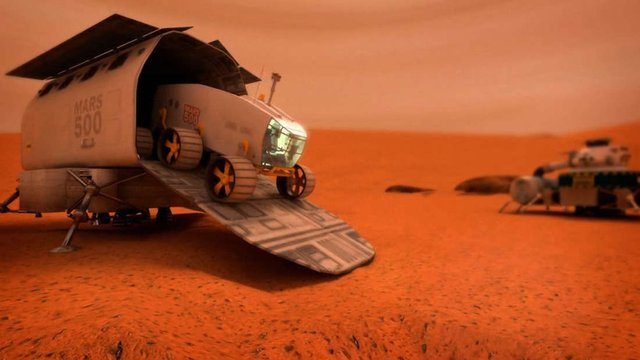Microbes May Be A Problem For Astronauts Going To Mars
A study of six people who spent 520 days in a mock Mars simulation on Earth has found that there might be a damaging decrease in microbial life on a mission to Mars.
Publishing their findings in the journal Microbiome, researchers studied participants in the Mars500 project, which saw six men confined to a mock-up spacecraft from June 3, 2010, to November 5, 2011, in Moscow.

During the course of the mission, the researchers found that microbial diversity decreased significantly, meaning there were fewer species of bacteria present. High microbial diversity is important for health, so there may be a health risk associated with long-duration missions to Mars.
“In addition to potential health risks for the crew, some of these microorganisms could have a negative impact on spacecraft, as they grow on and might damage spacecraft material,” Dr Petra Schwendner, corresponding author from the University of Edinburgh, said in a statement.
“To ensure the systems’ stability, countermeasures may be required to avoid development of highly resistant, adapted microorganisms, and a complete loss of microbial diversity.”
During the study, 360 microbial samples were taken from 20 locations in the habitat at 18 different points of the mission. The crew never left the zone during the mission and followed a strict diet and schedule, which included cleaning and conducting experiments.

The crew spent 17 months in isolation. ESA/Mars500
The reason for the drop in microbial diversity isn’t clear, but it may be due to repeated cleaning. Certain regions of the habitat were teeming with microbes, like the outside surface of the toilet, suggesting some surfaces should be covered with antimicrobial materials.
The most common microbes found belonged to the Bacillus and Staphylococcus species, which are associated with humans, suggesting they were mainly spread by the men.
Staphylococcus, in particular, is a common cause of skin infections, a problem when astronauts are millions of miles away from Earth. It was possibly transported around the habitat by the “Marstronauts” shedding flakes of skin.
Overall though, it was the decrease in diversity that posed the biggest problem. Before we go to Mars, discovering everything that could affect the health of astronauts will be crucial.
Follow me @helamia
@helamia,
Thanks for the nice post.
Salutations. JaiChai here.
RE: Your Post
People still don't know how our complex chemical ecosystem sustains us. Scientists are still divided on the issue. Do we keep everything clean? Or do we build up immunity? And antibiotic abuse has left total populations vulnerable to a host of evolved, super-pathogens that were treatable just a couple generations ago.
As an ex-pat in Asia, I always see newcomers deal with Montezuma's Revenge, the inevitable and prolonged diarrhea experienced by foreigners who begin to sample street vendor food.
It all makes me think about "War of the Worlds" and "The Day the Earth Stood Still".
Namaste, my friend.
JaiChai